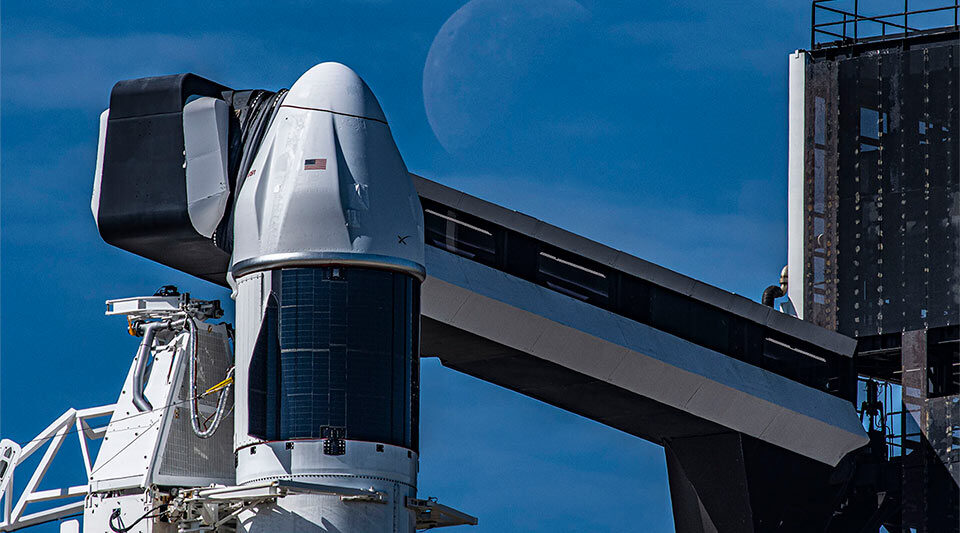University of Notre Dame researchers are taking their science to space aboard NASA’s 30th SpaceX commercial resupply services mission, which is slated to launch no earlier than Thursday (March 21).
The SpaceX Dragon cargo spacecraft will lift off from Florida’s Cape Canaveral Space Force Station and travel to the International Space Station (ISS), which is in orbit roughly 250 miles above Earth’s surface. In addition to food, supplies and equipment for the ISS crew, the spacecraft will transport an experimental study from researchers in Notre Dame’s Department of Aerospace and Mechanical Engineering.
Assistant Professor Meenal Datta, an affiliate of Notre Dame’s Harper Cancer Research Institute, is leading the study. She plans to use the unique microgravity environment found aboard the space station to gain new insights into human biology.
The self-contained experiment uses materials and methods similar to those Datta uses in her lab at Notre Dame, but the experimental procedures have been miniaturized and automated in partnership with Space Tango using its CubeLab technology.
“Researchers have been studying the body and biological processes in space since the ISS first launched,” she said. “It goes hand-in-hand with space exploration and is a key part of keeping astronauts safe and healthy. But increasingly researchers are turning their attention toward ways research in space can improve life on Earth.”
Datta’s experiment will shed light on glioblastoma, a fast-growing, aggressive and incurable form of brain cancer.
“There are all sorts of advantages to studying brain cancer in microgravity,” she explained. “When you study brain tumors on Earth, that usually means studying them in a flat layer in a dish on a benchtop. But the microgravity environment of the ISS provides conditions that in some ways mimic how a tumor would form when it is suspended within the brain’s tissues.”
Datta’s experiment focuses on one particularly difficult step in studying brain cancer: growing tiny structures that resemble human organs known as organoids. Organoids function as “stand-ins” or “avatars” for human tissues in experimental studies. Datta and her team use organoids developed from glioblastoma and immune cells to discover how immune cells interact with cancerous cells. They will be among the first researchers to grow glioblastoma-immune organoids in space and compare their growth and development to similar structures grown on Earth.
“Organoids form organically from human cells,” she said, “but in Earth’s gravity, they are heterogeneous and form slowly. Microgravity will provide an environment where they can form quickly and regularly, allowing for clearer and more reproducible results in experimental studies, including drug discovery and testing.”
To provide a control condition for the study, Datta’s lab at Notre Dame will run an Earth-based experiment parallel to the one that will take place during the 30-day space expedition. After the mission is complete, Datta and Alice Burchett, a doctoral student in Notre Dame’s Bioengineering Graduate Program, will collect the samples and thoroughly analyze the differences.
Datta’s experiment is not the first by a Notre Dame researcher to take place on the ISS. In 2021, Tengfei Luo conducted a groundbreaking study with Space Tango on the formation of bubbles in space, the results of which recently appeared in the Nature journal Microgravity.
Datta said she plans to work with Luo and a host of other researchers at Notre Dame to send additional experiments to the ISS.
“As surprising as it may sound,” Datta said, “when it comes to advancing health research, there are many things we can do more efficiently in space than on the ground. Space provides a better way to synthesize a reproducible model. And better models allow us to more quickly develop and test the treatments that can fight this cancer and ultimately save lives.”
In addition to the Harper Cancer Research Institute, Datta is an affiliate of the Eck Institute for Global Health, the Berthiaume Institute for Precision Health, NDnano, the Warren Center for Drug Discovery, the Lucy Family Institute for Data and Society and the Boler-Parseghian Center for Rare and Neglected Diseases.
Find more information, including instructions for viewing the launch, in NASA’s news release.
— Brett Beasley, Writer and Editorial Program Manager, Notre Dame Research
